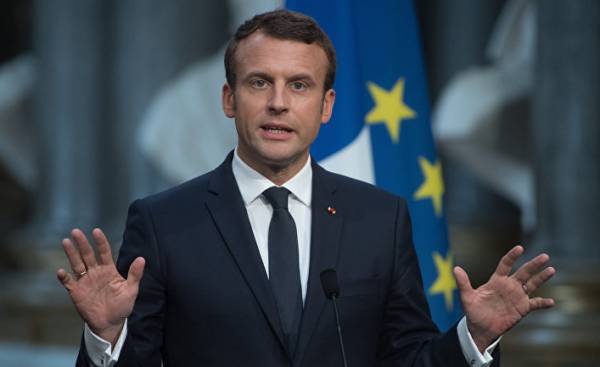
LONDON — next month will mark 10 years of the global financial crisis that began on 9 August 2007 when Banque National de Paris has announced that the cost of several of its funds, containing what was considered the most reliable mortgage bonds of the United States, evaporated. Since that fateful day, the advanced capitalist world has experienced its longest period of economic stagnation since the beginning of the decade, which began with the collapse of wall street in 1929 and ended 10 years later with the outbreak of the Second world war.
A couple of weeks ago at the conference Rencontres Économiques (Economic Meeting) in AIX-EN-Provence asked me if is it possible to do anything to prevent the “lost decade” of economic decline after the crisis. The session, entitled “Exhausted if we economic policy?”, my colleagues have shown that it is not. They brought many examples of policies that could improve the growth of production, employment, financial stability and income distribution.
This allowed me to focus on the issue, which to me seemed the most interesting: with so many good ideas, why are so few policies that could improve economic conditions and mitigate the resentment of the public, was implemented from the beginning of the crisis?
The first obstacle was the ideology of market fundamentalism. Since the early 1980-ies, politics was dominated by the dogma that markets are always right, and state economic intervention almost always wrong. This doctrine, together with the monetarist counter-revolution turned against Keynesian Economics, which arose as a result of the inflationary crises of the 1970s years. It has inspired political revolution Thatcher-Reagan, which, in turn, helped to accelerate a 25-year economic boom starting in 1982.
But market fundamentalism, has also inspired a dangerous intellectual error: that the financial markets are always rational and efficient; that Central banks should just plan for inflation and not worry about the financial stability and unemployment; that the only legitimate role of fiscal policy is to balance budgets and not the stabilization of the economic growth. Even after these errors blew up a market-fundamentalist Economics after 2007, market-fundamentalist policies have survived, preventing adequate political response to the crisis.
It should not be surprising. Market fundamentalism was not just intellectual fashion. Powerful political interests motivated the revolution in economic thinking of the 1970-ies. In advance of scientific proof that government economic intervention is almost always counterproductive, legalized tremendous changes in the distribution of wealth: from trade unions to the owners and managers of financial capital, and from government to organized labor to business interests. The Polish economist Michal Kalecki, co-author of Keynesian Economics (and a distant relative of mine), had predicted that politically motivated ideological reversal with uncanny accuracy back in 1943:
“The assumption that a government will maintain full employment in a capitalist economy if it knows how to do it wrong. Under a regime of permanent full employment “dismissal” will cease to play its role as a disciplinary measure, which will lead to pre-election booms caused by the government. Working out of control, and the captains of industry will be afraid to “teach them a lesson”. Probably between the interests of big business and rentiers will be the powerful block, and perhaps they will find a few economists to say that the situation was manifestly ill-founded”.
The economist, who said that the policy of the government to maintain full employment “clearly unfounded” is Milton Friedman. And the market-fundamentalist revolution against Keynesian Economics, which he was instrumental, lasted for 30 years. But, just as Keynesianism was discredited by the inflationary crises of the 1970s years, market fundamentalism has not succumbed to its own internal contradictions in the deflationary crisis of 2007.
The specific contradiction of market fundamentalism provides another reason for the stagnation of incomes and the recent rise of populist sentiment. Economists believe that policies that increase national income, for example, free trade and deregulation, is always socially beneficial, no matter how are these higher revenues. This belief is based on the principle of “Pareto optimality”, which assumes that people who receive higher income, can always compensate the losers. Therefore, any policy that increases aggregate income, should be useful to society because it can make some people rich, while leaving no one worse off.
But what if the compensation on which economists rely, theoretically, does not occur in practice? What if the market-fundamentalist policy expressly prohibits the redistribution of income or regional, industrial and educational grants, which would pay damages to those who suffered from free trade and “flexibility” of the labour market? In this case, from a social point of view, the Pareto optimality is not optimal. Instead, policies that enhance competition, whether in trade, labour markets or domestic production, can be socially disruptive and politically dangerous.
This highlights another reason for the failure of economic policy after 2007. The dominant ideology of non-interference of the government, of course, reinforces the resistance to change among the losers from globalization and technology and creates huge problems in the sequence of economic reforms. In order to succeed, monetary, fiscal and structural policies should be implemented together, in a logical and complementary manner. But if market fundamentalism blocks expansionary macroeconomic policies and prevent redistributive taxation or public spending, populist resistance trade, deregulation in the labor market and pension reform inevitably aktiviziruyutsya. Conversely, if a populist opposition makes structural reform is impossible, it promotes the conservative resistance to the expansionist macroeconomics.
On the other hand, suppose that the “progressive” Economics of full employment and redistribution could be combined with “conservative” economy of free trade and liberalization of the labour market. In this case, both the macroeconomic and structural policies would be easier to justify politically and to have a much greater chance of success.
Could it happen in Europe? The new President of France Emmanuel macron has built his campaign on the synthesis of the “right” of the labour reforms and the “left” easing of fiscal and monetary conditions, and his ideas are gaining more support in Germany among politicians of the European Union. If “Macroeconomic” — the attempt to combine structural policies with conservative progressive macroeconomics — will be able to replace the market fundamentalism, which failed in 2007, a lost decade of economic stagnation may soon end — at least for Europe.







